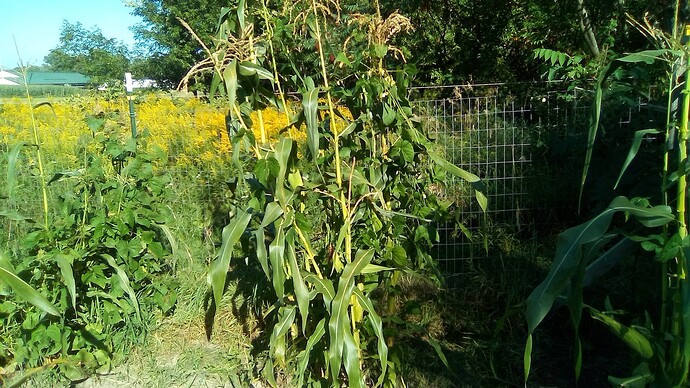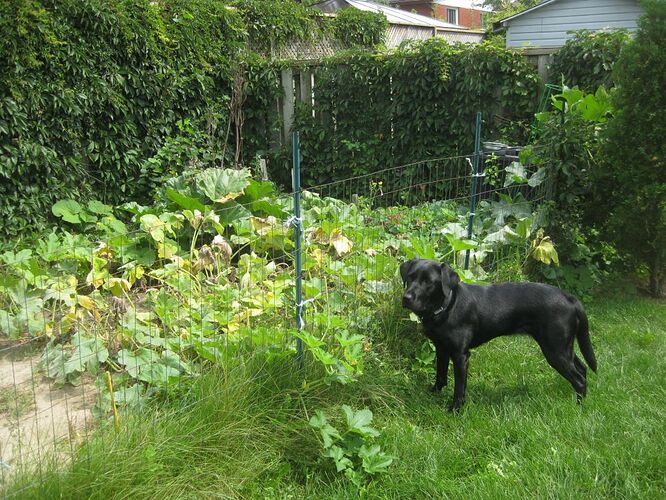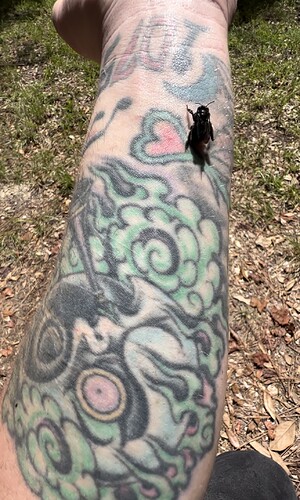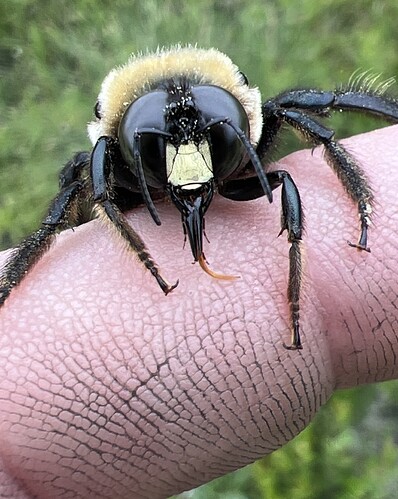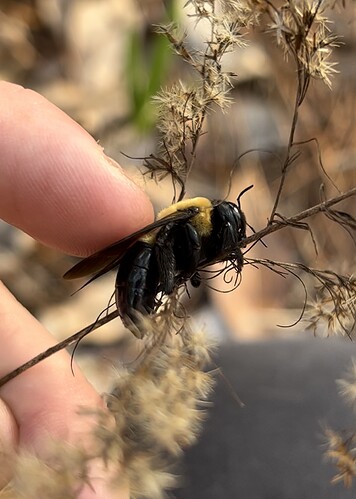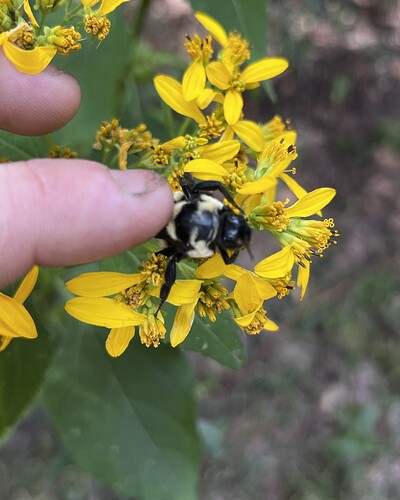I’ll check it out sometime this week. Maybe tonight if Incan get to it. But as far as I know, the three sister crops was still something m families did on their own and it was not anything like what was Europe.
I tried planting the three sisters this year. However, I did not do very well, mainly because I did not have enough time to weed and I did not plant the squashes at the right time. However, I did notice that the climbing beans kept the blackbirds away from the corn
Of course, the other explanation for the lack of blackbirds may have been that only about a third of the corn I usually grow made it to ear stage, making it not worth their while!
Good! I tried planting two sisters - beans and squash. Rabbits decimated the beans when they flowered, but the squash is doing fairly well ![]() . The rabbits do their work in the middle of the night when people and dogs are sound asleep.
. The rabbits do their work in the middle of the night when people and dogs are sound asleep.
The thinking is that corn was domesticated from teosinte in what is now Mexico (see Maize - Wikipedia). I’m sure that many variants were produced as it was taken back to Europe by explorers, and further by modern agricultural breeding. Similarly, ancestral species of beans and squash were present in the Americas before the arrival of humans (see Cucurbita - Wikipedia).
That’s exuberant squash! Sorry about the rabbits! It looks like they got through the fence. Your dog looks like he’s wondering where that rabbit scent came from (he looks a lot like mine).
I’m only about halfway through this book, but I really liked the chapter about gratitude, and The Words That Come Before All Else from the Haudenosaunee nations where they thank so many different things in the natural world. For me growing up (and I would imagine in most Christian faith traditions), the idea of thanking a river or a tree would be seen as idolatry or paganism – it would be putting something else before God. We could be thankful for a tree, but not to a tree.
But it was interesting that in the supplication described in the book, the people still thank the Great Spirit or creator god too. They don’t see anything incongruent about thanking God and thanking the creation itself. So it makes me wonder what it would be like to try and make my own gratitude more tangible and rooted in the physical world instead of just a mental/spiritual act. It’s so easy to just whisper up a prayer for food I’m about to eat, without really thinking anything about it except that I possess it and am glad I do. I don’t know if that would look like thanking a strawberry directly, or simply taking a little longer to appreciate the physical qualities of what is enjoyed from the earth rather than viewing it as just some theoretical, disembodied practice of uttering the word “thanks.” I think there’s a lot to learn from this… I’d be curious about others’ thoughts of whether there’s space in Christian tradition for being thankful to as well as for…
Agency having just been mentioned in another thread, I do not think I can be thankful to something which does not have agency. I’m reminded of the song from Godspell, “All Good Gifts”.
We plow the fields and scatter the good seed on the land…
But it is fed and watered by God’s almighty hand…
He sends us snow in winter, the warmth to swell the grain…
The breezes and the sunshine, and soft refreshing rain…
All good gifts around us
Are sent from Heaven above
So thank the Lord, oh thank the Lord for all his love…
We thank thee then, O Father, for all things bright and good
The seedtime and the harvest, our life our health our food
No gifts have we to offer for all thy love imparts
But that which thou desirest, our humble thankful hearts!
All good gifts around us
Are sent from Heaven above…
So thank the Lord, oh thank the Lord for all his love…
I really wanna thank you Lord!
I enjoy that song… and I think that’s a good way to look at it. I’m just thinking of ways to feel more connection to the earth itself. So often I revert to “this is a thing that God gave me so I could use it,” coming from the perspective of someone who lives in a throw-away-happy society, where it’s so easy to see all things around us as merely tools for us to use. Maybe a degree of personification can help me perceive a greater connection among the earth’s gifts, without necessarily resorting to talking to them. On that note… it may depend on your definition, but I don’t know that any of us can say for sure that a tree doesn’t have agency.
I’ve probably said to a bird or a spectacularly iridescent dragonfly with unexpected color (and maybe out loud), “What a wonderful creature you are!”, being thankful to God for it and for having providentially put us in the same temporal and physical proximity. I know I’ve said (not necessarily out loud), “I like your birds, Lord!”
Agency implies personhood though, I should think, and I don’t see anything in scripture that would support that. Of course we ascribe a degree of personhood to our pets, dogs especially. Cats? Not so much. ![]() (Although I’ve owned more cats than dogs. ; - )
(Although I’ve owned more cats than dogs. ; - )
And I don’t have a problem with talking to houseplants, up to a point. ![]()
I can relate to these thoughts. It’s never been my practice to thank the plants and animals that I eat, but rather I thank God the Creator for providing them. But I’m trying to see the parts of Indigenous thinking that make sense from a Christian perspective. Could one thank a non-human animal or a plant for submitting itself to God’s plan to become food for my tribe? After all, God the Creator gave the plants to us for food. In some way this shows respect for the animal or plant as part of God’s Creation, and that is a good thing, I think. Perhaps by thanking them, we learn to respect them more as fellow created beings.
I guess the danger in thanking created beings is that it could transform into worshipping them, which is idolatry. It seems to me that some First Nations fell into this form of idolatry, by building images of various forms and worshipping them.
I’ve thought about this, too. And I do think we can be thankful to as well as for. I wonder if anyone here has read Debra Reinstra’s excellent book Refugia Faith? Especially in her section “Gratitude and Joy” in chapter 5, Reinstra reflects on the Thanksgiving Address that Kimmerer shares in Braiding Sweetgrass. On page 176 of my copy, Reinstra says both:
- “But what if we were to give thanks not just for the creatures but to the creatures” and
- “Maybe we could create adaptations of the address along these lines: ‘We thank you, God, for the trees. Thank you for the many families of trees…’ It wouldn’t be so hard to include a little shout-out to the creatures in our devotional practices, embedded in appropriate thanks directly to God.”
I question whether we need to make the move from thanking the creatures (as in the Thanksgiving Address) to only thanking God for the creatures. Consider the fact that we regularly thank other humans (which no one construes with worshipping them, unless overdone, of course). Thus, I don’t think anyone need be offended then at the Thanksgiving Address’ direct thanks to other parts of creation (concluding with thanks to God).
In the middle paragraph of p. 176, Reinstra says: “In the … Doxology, we sing ‘Praise God, all creatures here below.’ Maybe we could use more frequent reminders, as in the [Thanksgiving] address, that the creatures are not just objects, materials, resources. They have being. We do not have to surrender human distinctiveness to admit this…”
Indeed, these other-than-human creatures have being. Wouldn’t thanking the creatures as per the Thanksgiving Address help our understanding of that – help us to learn to “beify” (not “deify”) the other-than-human creatures instead of objectifying them?
Reinstra comes back to “beingness” at the bottom of page 197: “The students seemed quite taken with and even awed by this idea of “beingness.” We had a word now to describe what we already knew: humans are not the only creatures on this planet who are beings. We are distinctive, of course. But other creatures have beingness too.”
“Beifying” all creatures (the human and “other-than-human”) is vital for us to stop “regarding plants, animals, lakes, or rivers as resources or objects” (Reinstra, p. 199, 2nd paragraph).
I really like this perspective, thank you. ![]() I have not read anything by Reinstra, but I will have to look into that book once I finish Braiding Sweetgrass. That is true that we usually have no problem thanking other humans (though I have known people who are almost fearful of receiving thanks for fear of robbing God). But yes, the real problem is objectification – seeing everything else on the earth as if it were nothing more than a dead thing for us to use.
I have not read anything by Reinstra, but I will have to look into that book once I finish Braiding Sweetgrass. That is true that we usually have no problem thanking other humans (though I have known people who are almost fearful of receiving thanks for fear of robbing God). But yes, the real problem is objectification – seeing everything else on the earth as if it were nothing more than a dead thing for us to use.
Another chapter in Braiding Sweetgrass talks about the “animate” nature of an Indigenous language the author was learning. Rather than being mostly nouns like ours, it was mostly verbs. They had a word for “to be a bay” and other things that made what we would see as objects come alive to them. That was fascinating to me, how language and outlook shape each other.
I definitely don’t get the sentiment that animals are giving themselves to us to eat. They mention things like…… felt the spirit of the animals give them permission and so on…. But the reality is that the animal does not want to die. It’s absurd to thank an animal for killing and eating it. I can’t just be…. Well I felt in my heart that my neighbors dog wanted me to kill it, then chop up its corpse and eat it’s dead body and thank the ghost of the animal……
That’s also not just a white vegan thing either. There are a bunch of indigenous vegans. They often speak out against how mass market consumption of commercialized animals is a byproduct of colonialism that was meant to undermine the lifestyles of indigenous people.
It goes all the way back to the fur and leather trade. Europeans begin to place higher value on the leather of cows than of deer, making a market with deer hides less profitable. The “civilization acts” of natives pushed a farmland agenda on them. So instead of living closely together they begin to need larger plots of land to raise livestock on. They cut down more wild spaces to have more pastures and crops for animals. The Creek Indians actually talked about parts of this in some of their first few episodes of their podcast.
With that said I do think it’s emotionally healthy to give into the freedom of enjoying thanking nature. I thank bees all the time for them staying still so I can get pics.
I also think it’s ok to compliment trees for being beautiful, or providing shade or thanking them even for being a home for so many animals. I don’t think suspending aspects of reality in order to be more grateful is a problem. As long as it’s not centered around pretending an animal is thankful for you torturing it and stuff.
I am trying to put myself in the shoes of a person living in North America before European contact in order to understand a way of thinking, and what is Christ-honouring. I think vegetarian/vegan-ism is a good thing, and can be Christ-honouring. God bless you for doing that. I am all about treating animals as beings (“beifying” - I like that term). In my household, when someone wants to squish a spider, I go get a jar to capture it and take it outside. (But I am irrational: I will kill a mosquito with no qualms ![]() ).
).
Edit: with reference to a part of the Thanksgiving Address in the book (p. 108):
We turn our thoughts to all of the Fish life in the water. They were instructed to cleanse and purify the water. They also give themselves to us as food. We are grateful that they continue to do their duties and we send to the Fish our greetings and our thanks.
From the point of view of an Inuit person, living in Canada’s far north, being a vegetarian before modern transportation was not possible. These people had to rely on fish and meat from seals and other creatures. As I understand it, they can be hunted with respect, including killing with minimal suffering. Perhaps a way to help “beify” these animals is to thank them for submitting to death to feed the people of the community.
Just saying that argument works with nothing else. It’s hard to thank victims for being victims. It’s hard to grab the most minute thing from hundreds of years ago and say see it worked then so it works now. Whales have never submitted to being killed. Whales were never willingly going to be killed. Just like fish are not willingly dying for whales. It’s just plain old predator and prey and it’s silly to consider prey as willingly wanting to be victims.
It’s also difficult to say well, I smashed a mosquito therefore it’s ok to house millions of cows in crappy small spaces , where they go through constant psychological terror of losing their calves and so on. Then starving them and. It wasting water on them for as long as possible leading up to the hours of their death where they panic, and smell blood and so on.
So 99.99% of the population does not eat even 1/10th of their food from hunting. That includes indigenous people as well. The overwhelming majority of people don’t live in spots that are similar to how it was a few hundred years ago.
Within spiritually driven people we see odd beliefs. We see Christians thinking god wants them to go to walk mart vs Publix on a daily basis. We see people claiming to have this special one if kind personal relationship with god when the reality is that what you learn about god comes from the Bible. Same for me and everyone else. I hike a lot. I spend more time in nature than most people. Most people don’t even hike. Even those thst hike don’t typically and consistently hike 20+ hours a week. Let alone 40 hours a week. I spend a lot of time just laying down under a tree reading a book or just watching wildlife. Ever since I was a kid I’ve taken my leftovers and food that was going to waste and spread it outside. Even to this day I take berries and dried syrup and place it near ant hills. There will still never be a deer who is guided by the spirit of the forest to come and lay down at my feet hoping I’ll shoot a arrow through its heart , slice it’s throat and drain it of blood before sticking hooks or tying nots around it feet to lift it up. Behead it, slice open its stomach and remove its guts and then chop off its hooves and begin to rip its fur and skin from its body so that I can cook it.
You just can’t really have a solid ground to stand on and say respect animals when your plates are full of meat that came from a entire compound where cows have tables under them to keep them from collapsing while they are drained of milk pst being filled with chemicals to keep them producing and their babies are taken to small cages that they can’t even stand up in and force fed over a period of weeks to become veal. The mothers are constantly impregnated and die around 1/3-1/6 of their lifespan. Does not mean it’s any better to squish a bug on your windshield. None of us can be perfect. But not being perfect is not an excuse and it’s not always the same.
Imagine a rapist just casually tossing out well, we do our best and sometimes we mess up and you know…. Well most of y’all probably look at a woman for a few seconds.
Not saying you are bad for eating meat. Just that we need to stop romanticizing this belief that they are here to be eaten and it’s their desire to be our victims.
Sorry, didn’t read the whole thread, but do you feel differently about sustainable farms, or free-range (for lack of better words) type, small family farms, etc.? There are lots of people doing sustainable farming where capitalism doesn’t drive every ounce of hanging weight of the animal.
I’m interested in this because we will be exploring “food” as a topic in the future specifically more that may touch on some of these concerns. However food comes to us, don’t we always thank God for giving us food/four our meal? Like whether we made it from a box, bought it from McDonalds, or our own garden. Should we not thank God for giving us the ability to purchase/obtain nourishment for our bodies to sustain ourselves? for being alive? providing calories?
I have wrestled with ethical consumption in many forms over the years (clothing, food, etc), but at the end of the day, a lot of it is unavoidable and I don’t think it’s fair to lump all of these actions together.
Yes, we had her on our podcast about her book as well: Debra Rienstra | The Discipline of Hope - BioLogos
I would say eat whatever you want to eat. But don’t pretend that animals want to die so you can eat them. Don’t pretend that even on small farms, that these animals are being treated with dignity and respect. If someone thinks they are, then get a animal, raise it up like you raise your pets, and then let someone take them to the butcher and see if you feel their life was actually being respected. If you treat animals like cows, pigs and chickens with love, dignity and respect they will be trying to play with you, cuddle with you and look forward to seeing you. Just like a dog or a cat. You can google the affection of these animals. But you can’t say you care about them if you kill them. It would be like
If I raised my cats and dogs up just to break their neck after a year and eat them.
What sparked the convo was talk about animals wanting to be victims for humans and that’s just not something that seems to be evident. Does not matter
If you thank god for it or not.
Just wanted to clarify.
I don’t think it’s a sin to eat meat. I mean I feel like it should be. I really don’t understand how Jesus as a creator of life could kill animals and eat them. It makes me doubt him more than anything to be honest. A god that feasts upon the flesh and blood of its creation is really weird to me. Part of what makes me able to accept God as love is that I don’t believe he actually wanted animal sacrifices. I think that mankind wanted it and so he accommodated them. It’s also why it’s easier for me to actually see Yahweh the father as the more loving and compassionate one over Jesus. I accept Jesus because I accept God. If Jesus was just some regular dude here today I would think he was obviously really loving, and I would ignore him eating animals but as soon as he started talking about sacrificing animals I would have a somewhat negative view of him.
Anyways. I don’t think people are evil because they eat meat. I think most people eat meat because it tastes good and they are out of touch with how their food ends up on their plate. I do think anyone and everyone who owns livestock to raise up and murder is kind of disgusting. I have never seen any positive videos of slaughter houses. I think if most people went out and spent a year with cows, chickens and pigs they would not want to eat then as much.
But eating meat is such a normal part of society that I mostly just ignore it. So i presume almost everyone here eats meat. I don’t really think of anything negative against any of y’all over it. I basically just blur it in my mind. By that I mean when I’m taking to any of y’all, I’m not sitting around thinking of your diet. It’s only in discussions like this that it really comes to my mind and it’s mostly directed towards the belief that animals are wanting to be victims.
I respect the deeply held views of all honest Christians, including on whether to eat meat or not. I admire your stand on this. I expect that there are a wide range of views on this here. Personally, I don’t eat all types of meat, in part because of my views on the humane treatment of animals. But, I don’t judge other well-considered views. The Jesus I know wants us to care about animals as fellow created beings, treating them humanely.
I would agree that animals don’t want to die. With regards to the Indigenous Thanksgiving Address, perhaps the writer was referring to the fish submitting to being food, as in submitting to something they do not want. I am not justifying anything, just attempting to understand the thinking.
Edit: I’m not sure that “submitting” is the meaning the writer intended either. Perhaps “taking part in creation” that they may be used for food would be better. Not “wanting” or even “submitting” to be used as food.
The episode is out today!!
Did the panelists have any other insights you missed?
